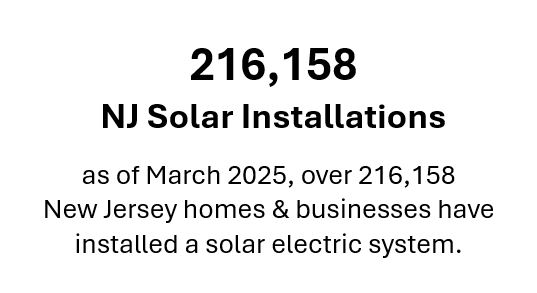Net Metering and Interconnection
Background
Consistent with the Solar Act of 2012, a proposal to adopt amendments to the net metering rules for public sector projects serving multiple properties was published in the New Jersey Register on April 15, 2013. A copy of the rule proposal which became effective upon publication can be found on the Board's website. The rule at N.J.A.C. 14:8-7 can be found on here.
Interconnection
The NJBPU requires that customer-generators have interconnection agreements in place with their EDCs. These agreements govern connection to the electric grid and specify the terms and conditions, technical requirements, and safety and testing requirements needed. Utility contact information and utility specific website pages with forms are available (links directly to the utility Interconnection forms page) for each of the NJ BPU regulated electric utilities.
NJ certification numbers will not be issued until the NJCEP receives a copy of the EDC Notification. For behind-the-meter solar energy systems, this document is the Electric Distribution Company (EDC) or Municipal Electric Utility (MEU) authorization to energize the system. For merchant power generators, this document is PJM or EDC authorization to energize the system.
If you are experiencing a delay in receiving a response from your EDC and wish submit a specific complaint regarding the interconnection of your project, please submit an Interconnection Complaint.
The EDCs will require at the time of interconnection the existence of sufficient load to justify the capacity installed.
Net Metering in New Jersey
Net metering helps customers maximize their renewable energy investments. It enables customers to receive full retail credit on their utility bill for each kWh of electricity their system produces over the course of a year. At the end of an annualized period, the customer-generator will receive credit on their utility bill at the wholesale value of electricity for any excess generation that remains.
When a renewable energy system produces more electricity than the customer actually uses, the customer will be compensated with credits at the full retail value of the electricity for the production over and above what they use. For example, on a typical sunny day at moderate temperatures, a customer with a solar system may use less electricity than the system actually generates. When electricity production exceeds usage, the utility meter will spin backwards and provide the customer with credits for the excess energy produced. These credits can be used by customers as needed.
With net metering, your electric meter spins forward when electricity flows from the utility into the home, and backwards when power flows from the home to the utility. Your stored kWhs are "netted," or paid back, on an annual basis.
Please be advised that when a net metered customer with a renewable energy system switches their electric supplier or elects to change their anniversary date, any excess generation that exists at the time of the change is credited at the wholesale electric rate known as Locational Marginal Pricing (LMP) rather than as a full retail credit. The solar electric generation balance is zeroed out and a new 12 month cycle begins on the effective date of switching to the new electric supplier or of establishing a new anniversary date. It is recommended that you consult with your existing supplier to understand the status of your net metering account prior to switching electric suppliers. The full text of the applicable rule may be found at N.J.A.C. 14:8-4.3 j (1) and (2).
Together, New Jersey's interconnection rules along with the net metering rules ensure that customers with renewable energy systems or generators are compensated for the clean, renewable energy they produce.
Eligibility for Interconnection and Net Metering
All electric utility companies regulated by the NJBPU (PSE&G, JCP&L, Atlantic City Electric, and Rockland Electric) and electric suppliers or providers must offer net metering to retail customers that generate electricity through renewable systems. To be eligible for net metering, the generating capacity of a system cannot exceed the customer's annual electric needs. The interconnection rules are intended primarily for customer-generators that are eligible to net meter. The rules include three levels of review process dependent upon the size of the generator and other criteria.
Benefits
New Jersey's Net Metering program has served as a model for other states and continues to lead the industry in streamlining the net metering rules to ensure customers with small, on-site, renewable energy systems (solar, wind, and biopower) can easily connect to the electric grid through their utility companies.
The interconnection and net metering rules are designed to motivate customers to invest in renewable energy sources on their properties by ensuring that customer-generators are compensated for the energy they produce. They provide a key incentive for customers to contribute to the availability of safe, reliable, and affordable electricity and help protect our environment in New Jersey.
Prior Meetings
| Meeting Date | Notice / Agenda | Meeting Materials |
| Nov 19, 2024 | Notice | Slide Deck, Webinar Recording |
Utility Interconnection Forms
Net Metering and Interconnection Petitions, Reports and Orders
- IMO The Petition of Sunpower re: DRPA 12.06.19
- IMO The Petition of Sunpower re: DRPA PSEG Motion to Intervene 11.13.19
- IMO The Petition of Solops and CRA for Waiver of the Rule 02.22.17
- NJLand Response to JCPL Motion to Intervene 06.20.16
- Solops, Onyx, CRA National Business Park Petition for Waiver 05.31.16
- NJ Land Petition for Declaratory Relief re: Onsite Generation 04.22.16
- ACE - Rider NEM Tariff Filing 11.19.15
- Six Flags Site Plan Overall Map
- KDC Six Flags Response to Order 03.19.15
- KDC Six Flags EE Report 03.09.15
- Conditional Approval of KDC Six Flags Petition to Waive Net Metering Rules 02.11.15
- Joint Petition of KDC and Six Flags (Great Adventure) for Waiver of Net Metering Rules
- Bloom Energy Petition (Interconnect Natural Gas Fuel Cells as a NJ Class I)
- EDC Mixed Generation Presentation Aug 2014
- KDC Solar LLC (Approval of Declaratory Relief)
- NJLand (Request for Declaratory Relief On-site Generation)
- Jed Horovitz (Denial of Request to Interconnect before Usage History)
- Indoor Sports Pavilion (Denial of Request to Waive N.J.A.C. 14:8-4.3(j)
- EDC Procedures for Eliminating Outdated Net Metering and Interconnection Applications
- Expansion of Aggregated Net Metering Pilot 05.12.10
- ACE Aggregated Net Metering Report 03.02.10
- Redskye Farms (Order approving Petition) 07.03.08
Atlantic City Electric's Power Ahead Program
- ACE - Analysis of BTM DG 09.23.16
- ACE Communication Plan to Promote BTM Solar I/M/O the Merger of Exelon and PHI 09.19.16
- I/M/O the Petition of ACE for Approval of...and a Grid Resiliency Initiative: Settlement Stip 08.24.16
- Notice Letter to BPU re: DER Merger Commitments 06.21.16
| EDC Semi-Annual Reports | |
| 2023 |
| Jan 1 to Jun 30, 2023 | Jul 1 to Dec 31, 2023 |
| ACE | ACE |
| JCP&L | JCP&L |
| PSE&G | PSEG |
| RECO | RECO |
Click to expand/collapse reporting years.
| Archived EDC Reports | |
| 2022 |
| 2021 |
| 2020 |
| 2019 |
| 2018 |
| 2017 |
| 2016 |
| 2015 |
| 2014 |
| 2013 |
| 2012 |
| 2011 |
| 2010 - 2005 |








.jpg)
